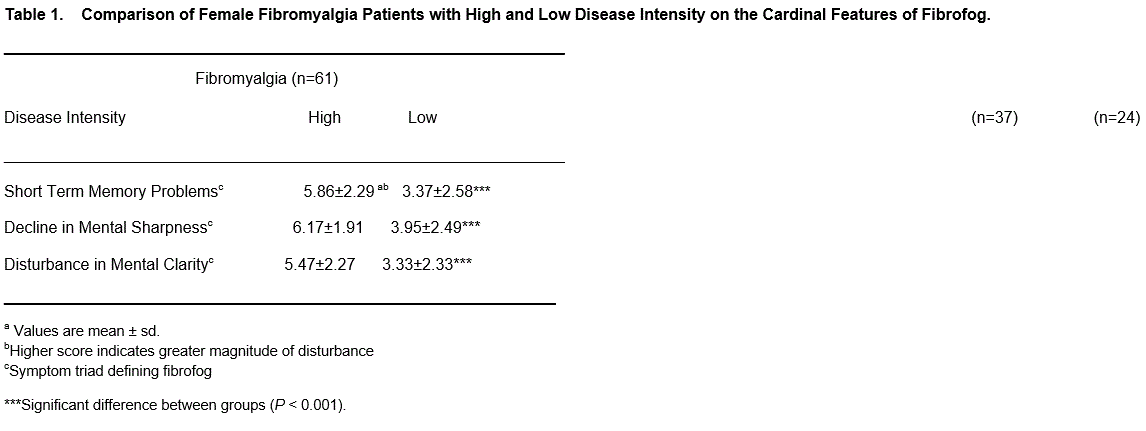Session Information
Date: Sunday, November 8, 2015
Title: Fibromyalgia, Soft Tissue Disorders, Regional and Specific Clinical Pain Syndromes Poster I
Session Type: ACR Poster Session A
Session Time: 9:00AM-11:00AM
Background/Purpose: : A triad of symptoms defines cognitive dysfunction in fibromyalgia known as fibrofog. The set of primary signs are short-term memory loss, a general loss of mental sharpness, and a disturbance in mental clarity. The stability of this symptom triad is uncertain, in a disorder than is marked by a high degree of symptom variability. The purpose of this study is to determine if the level of disease intensity needs to be taken into account, when assessing the symptom triad that defines fibrofog.
Methods: Participants were 61 female patients with a clinical diagnosis of fibromyalgia with a mean age of 50. 7±14.0 years and a mean education of 15.2±2.2 years. Data on memory loss was collected on a 0-10 point Likert scale with anchor points of no problems to severe problems. Data on mental sharpness and mental clarity were derived from the 16 item Mental Clutter Scale. Disease intensity was measured on a 4 point scale ranging from usual symptom status to symptoms severely intensified.
Results: For analytical purposes, disease intensity was collapsed into two categories; low and high disease intensity. The percentage of high and low disease intensity was 60.7% (37/61) and 39.3% (24/61) respectively. Comparisons between low and high disease intensity on short term memory, mental sharpness and mental clarity are shown in Table 1. As can be seen, high disease intensity was related to more severe problems with memory, significant reductions in mental sharpness (p<0.001), and severe disturbances in mental clarity (p<0.001). The mental clarity score of 3.33 in the low intensity group is approximately one standard deviation below the normative range for fibromyalgia patients with cognitive dysfunction (normative mean: 5.0±2.3).
Conclusion: Patients with fibromyalgia can and do present with mild to severe symptom variants. These symptom variants are associated with marked differences in the manifestations of the cardinal features of fibrofog. In the milder symptom variants of fibromyalgia, symptom expression of fibrofog is likely to be muted. In fibromyalgia, knowledge of disease intensity is likely critical for accurately assessing the presence of fibrofog and needs to be taken into account.
To cite this abstract in AMA style:
Katz RS, Leavitt F. Fibrofog in Mild and Severe Variants of Fibromyalgia [abstract]. Arthritis Rheumatol. 2015; 67 (suppl 10). https://acrabstracts.org/abstract/fibrofog-in-mild-and-severe-variants-of-fibromyalgia/. Accessed .« Back to 2015 ACR/ARHP Annual Meeting
ACR Meeting Abstracts - https://acrabstracts.org/abstract/fibrofog-in-mild-and-severe-variants-of-fibromyalgia/

